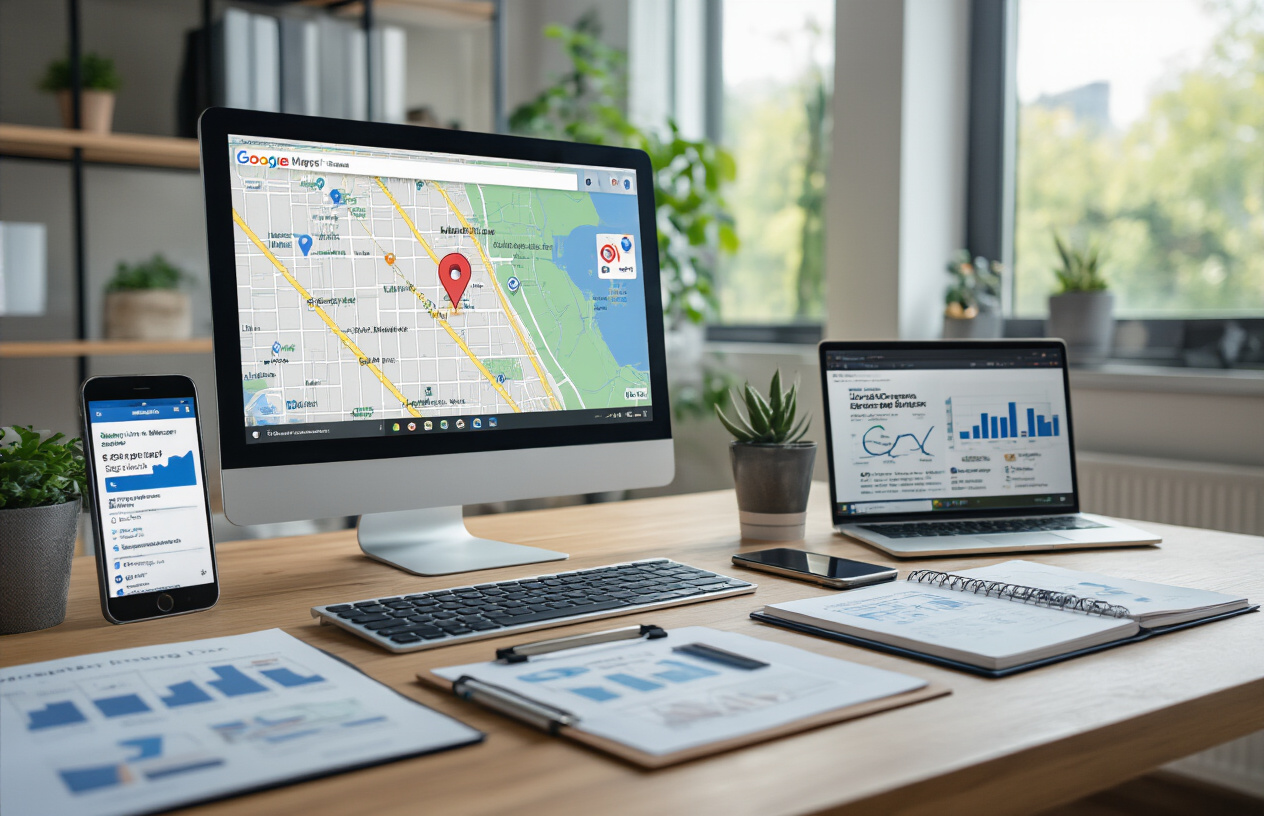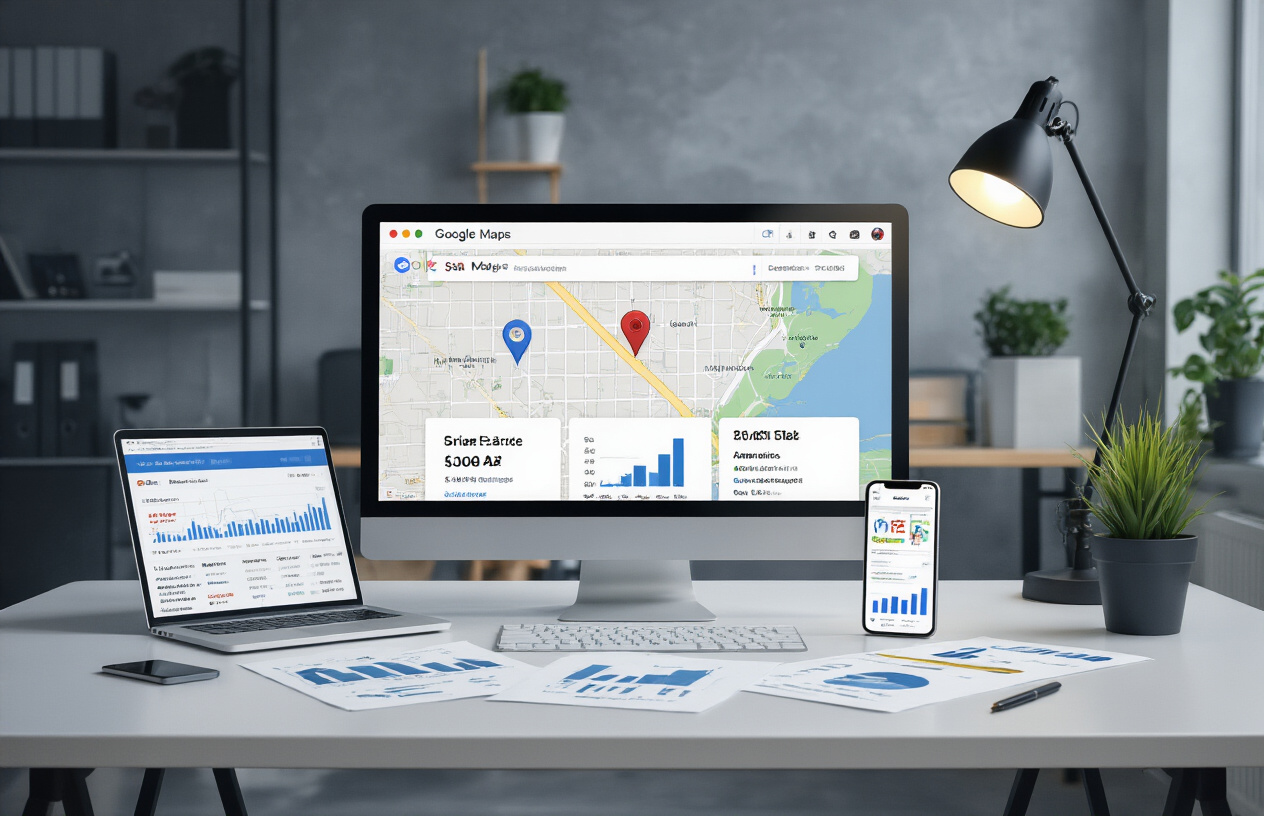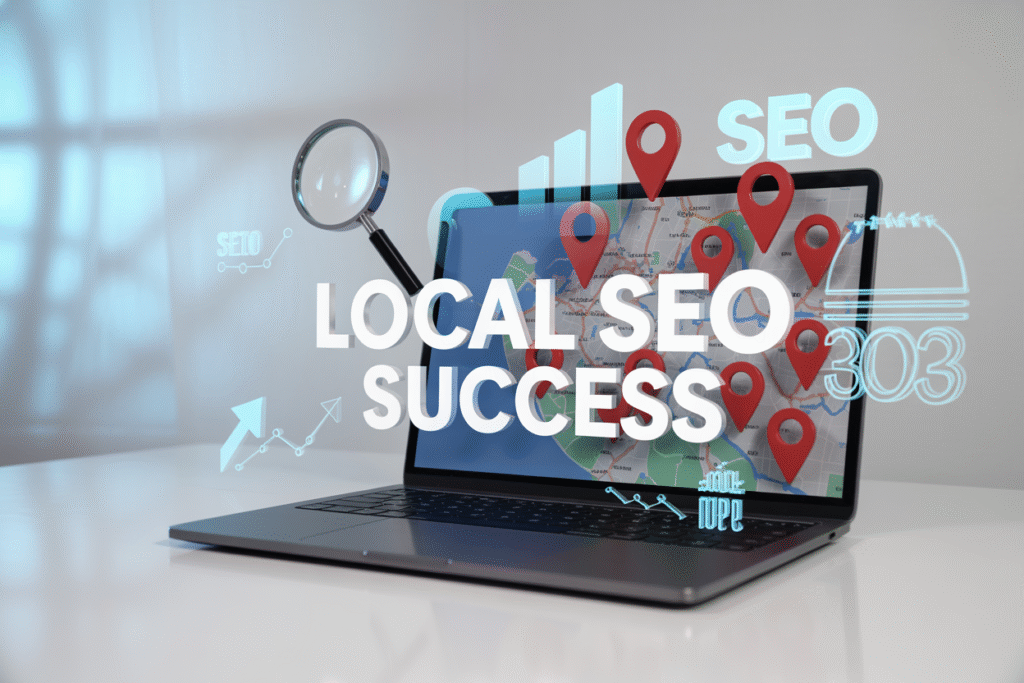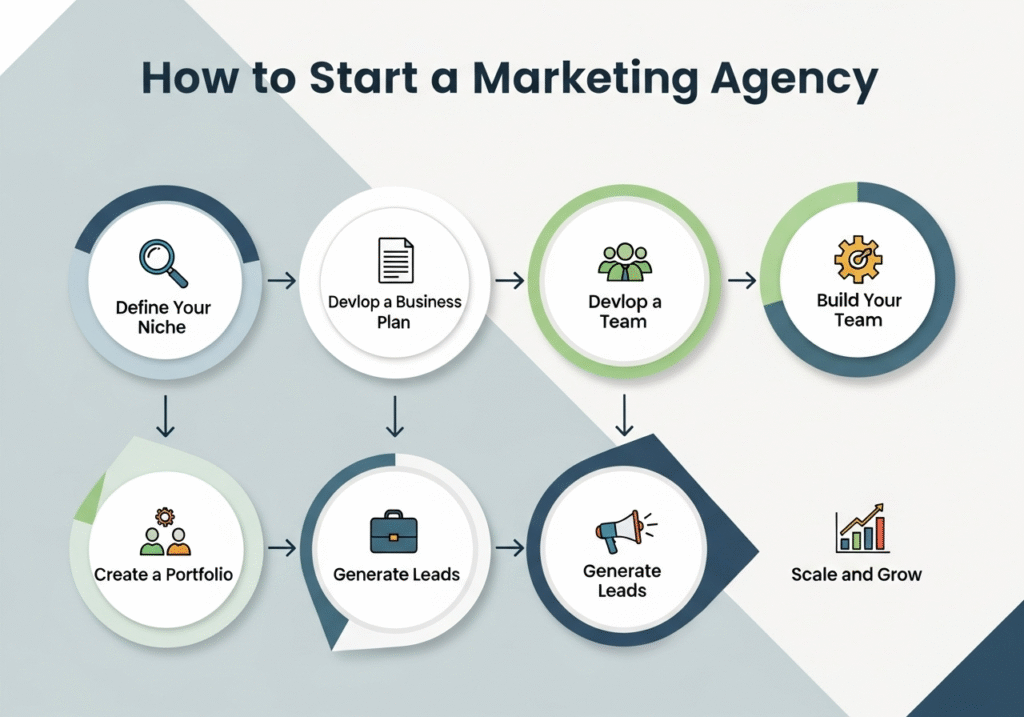Local businesses struggling to show up when customers search nearby know the frustration of being invisible on Google Maps. Targeted SEO Services Limited helps brick-and-mortar companies rank Google Maps listings higher, driving more foot traffic and phone calls from local searchers actively looking for their services.
This guide is designed for small business owners, marketing managers, and entrepreneurs who want to dominate their local market through strategic Google Maps SEO.
Local businesses in competitive markets like restaurants, dental offices, plumbers, and retail stores will find actionable strategies to outrank competitors and capture more local customers.
We’ll walk through the essential components that make local SEO services effective, including how to optimize your Google Business Profile and build the authority signals Google values most.
You’ll also discover advanced techniques for climbing local search rankings that go beyond basic optimization, plus practical ways to measure your return on investment from local SEO strategies.
Learning Google Maps Local SEO Fundamentals

How Google Maps Rankings Impact Local Business Visibility?
Google Maps SEO directly affects how customers discover and connect with local businesses. When potential customers search for services in their area, Google displays a “Map Pack” featuring three prominent listings with contact information, reviews, and directions.
These prime positions receive significantly more clicks than traditional organic search results below. Local businesses appearing in the Map Pack experience increased foot traffic, phone calls, and online inquiries.
Studies show that 46% of Google searches have local intent, making Map Pack visibility essential for capturing nearby customers. Businesses ranking in these top three positions often see 30-50% more website visits compared to those appearing only in organic results.
The impact extends beyond immediate visibility. Higher Google Maps rankings build trust and credibility with potential customers. Businesses with strong Map Pack presence often receive more positive reviews, creating a positive feedback loop that strengthens their local search position over time.
Mobile searches amplify this impact even more. With 58% of local searches happening on mobile devices, Google Maps integration with mobile navigation makes top-ranking businesses the default choice for customers seeking immediate solutions.
Key Ranking Factors That Determine Map Pack Placement
Google evaluates multiple signals when determining local search rankings. Distance remains a fundamental factor – businesses closer to the searcher’s location typically receive preference. However, proximity alone doesn’t guarantee top placement.
Relevance plays an equally important role. Google analyzes how well a business matches the search query, examining business categories, descriptions, and associated keywords. Local SEO services focus heavily on optimizing these relevance signals through strategic keyword placement and accurate business information.
The ranking factors that matter most include:
- Google My Business completeness and accuracy
- Review quantity, quality, and recency
- Citation consistency across directories
- On-page SEO optimization
- Local backlink profile strength
- Website mobile-friendliness and loading speed
Prominence also influences rankings significantly. Google considers how well-known a business is both online and offline. This includes mentions across the web, social media presence, and traditional advertising efforts. Businesses with stronger brand recognition often outrank smaller competitors even when other factors are similar.
User behavior signals provide additional ranking influence. Click-through rates, time spent on business listings, and direction requests all indicate customer engagement levels that Google factors into ranking decisions.
The Connection Between Google My Business and Local Search Success
Google My Business serves as the foundation for all Local SEO strategies. This free platform controls how businesses appear across Google services, including Maps, Search, and Shopping. Complete and optimized GMB profiles significantly improve local search rankings and customer engagement.
Business owners must claim and verify their listings before accessing optimization features. Verified businesses can add photos, respond to reviews, post updates, and track performance metrics. These activities signal active management to Google’s algorithms, often resulting in improved visibility.
Essential GMB optimization elements include:
| Component | Impact on Rankings |
|---|---|
| Business Name, Address, Phone | Foundation for local search |
| Categories | Determines search query relevance |
| Business Hours | Affects local search timing |
| Photos | Increases click-through rates |
| Reviews Management | Builds trust and improves rankings |
| Posts and Updates | Shows business activity |
Regular GMB maintenance proves crucial for maintaining strong local search performance. Businesses that update their profiles weekly, respond to reviews promptly, and add fresh photos consistently outperform competitors with stagnant profiles.
Google My Business Insights provide valuable data about customer interactions, including search queries, actions taken, and photo views. This information helps businesses understand customer behavior and adjust their Local SEO strategies accordingly.
The integration between GMB and Google Maps creates seamless customer experiences. When users click on map listings, they access business information, reviews, photos, and contact options directly within the Google ecosystem, making GMB optimization essential for converting local searches into customers.
Essential Components of Targeted Local SEO Services

Google My Business Optimization and Management
Your Google My Business profile serves as the cornerstone of Local SEO Services success. A well-optimized GMB listing directly impacts how your business appears in local search results and Google Maps rankings.
Start by claiming and verifying your business listing, then focus on completing every available field with accurate, detailed information. Business categories play a crucial role in Local Business SEO performance.
Select your primary category carefully, as this tells Google exactly what your business does. Add relevant secondary categories to capture additional search opportunities without diluting your main focus.
Regular posting keeps your GMB profile active and engaging. Share updates about products, services, events, and company news. Posts with images typically perform better and encourage more user engagement.
Include location-specific keywords naturally within your post content to strengthen your local search signals. Photo optimization significantly impacts click-through rates and customer engagement. Upload high-quality images of your storefront, interior, products, and team members.
Google favors businesses with comprehensive photo galleries, and customers trust businesses that show transparency through visual content. Business hours accuracy prevents customer frustration and supports better rankings.
Keep holiday hours updated and use the special hours feature for temporary changes. Enable messaging features to capture leads directly through your GMB listing, creating another touchpoint for potential customers.
Local Keyword Research and Implementation Strategies
Effective Local SEO Strategies begin with understanding exactly how your target customers search for businesses like yours. Local keyword research differs from traditional SEO because it combines service-based terms with location modifiers.
Start by identifying your core services, then add geographic qualifiers like city names, neighborhoods, and “near me” variations. Long-tail keywords often provide better conversion opportunities for local businesses.
Instead of competing for broad terms like “restaurant,” target specific phrases like “best Italian restaurant downtown” or “family-friendly pizza near Central Park.” These searches typically indicate higher purchase intent and face less competition.
Competitor analysis reveals keyword gaps and opportunities. Examine what terms your local competitors rank for and identify underserved keyword opportunities. Tools like location-based search suggestions help uncover the exact phrases your potential customers use when looking for businesses in your area.
Implementation requires strategic placement throughout your digital presence. Incorporate local keywords naturally into your website content, meta descriptions, and GMB profile.
Create location-specific landing pages for businesses serving multiple areas, ensuring each page targets relevant local search terms while providing genuine value to visitors.
Track keyword performance using local rank tracking tools. Monitor how your targeted terms perform across different geographic areas and adjust your strategy based on actual search volume and conversion data rather than assumptions about customer behavior.
Citation Building and NAP Consistency Maintenance
Citations act as trust signals that validate your business legitimacy across the web. Consistent Name, Address, and Phone number (NAP) information across all online directories strengthens your local search authority.
Even minor inconsistencies can confuse search engines and weaken your Google Maps Optimization efforts. Start with major directories like Yelp, Yellow Pages, Better Business Bureau, and industry-specific platforms.
Quality matters more than quantity – focus on authoritative sites relevant to your business type and location. Each citation should match your GMB profile information exactly, including business name formatting and address abbreviations.
Local directories and niche platforms often provide the most value for specific business types. Restaurants benefit from food-focused directories, while contractors should prioritize home service platforms.
Chamber of Commerce listings and local business associations offer high-quality citation opportunities with community relevance. Citation auditing prevents harmful inconsistencies that damage search rankings.
Regular monitoring catches duplicate listings, outdated information, and incorrect details that might confuse potential customers. Use spreadsheets or specialized tools to track all your business listings and their current status.
Automated citation management tools can streamline the process for businesses with multiple locations or limited time resources. These platforms help maintain consistency across hundreds of directories while providing reporting on citation health and opportunities for improvement.
Review Management and Reputation Enhancement
Online reviews directly influence both search rankings and customer decisions. Google considers review quantity, recency, and diversity when determining local search positions.
A proactive review management strategy helps businesses maintain positive online reputations while supporting their SEO Services Limited goals. Encourage satisfied customers to leave reviews through multiple touchpoints.
Email follow-ups, receipt inserts, and verbal requests all generate review opportunities. Make the process simple by providing direct links to your review profiles and clear instructions for leaving feedback.
Response strategies show that your business values customer feedback. Reply to all reviews, both positive and negative, with professional and personalized responses.
Thank customers for positive reviews and address concerns raised in negative feedback with solutions and contact information for further discussion. Negative review management requires careful handling to protect your reputation.
Respond quickly and professionally, taking responsibility where appropriate and offering to resolve issues offline. Never argue publicly with reviewers or delete legitimate negative feedback, as this can damage trust with potential customers.
Review diversity across multiple platforms strengthens your online presence. While Google reviews carry the most weight for local rankings, reviews on Yelp, Facebook, and industry-specific platforms contribute to overall reputation management and provide additional opportunities for customer engagement and local SEO improvement.
Advanced Techniques for Dominating Local Map Rankings

Location-Specific Content Creation and Optimization
Creating content that speaks directly to your local market makes all the difference when competing for Google Maps visibility. Smart businesses develop neighborhood-specific landing pages that target micro-locations within their service area.
These pages should feature locally relevant keywords, mention nearby landmarks, and address community-specific pain points. Your content strategy needs to go beyond simple keyword stuffing.
Write about local events, seasonal trends affecting your area, and community issues your business helps solve. For instance, a plumber might create content about “common winter pipe issues in downtown Springfield” or “preparing your home’s plumbing for summer storms in the riverside district.”
Location-specific blog posts perform exceptionally well for local SEO services. These articles should reference local news, community events, and area-specific challenges.
Google recognizes authentic local content and rewards businesses that demonstrate genuine community involvement through their content marketing efforts.
Local Link Building and Community Engagement Strategies
Building authority through local connections creates powerful ranking signals for Google Maps optimization. Partner with other local businesses for cross-promotional opportunities, sponsor community events, and engage with local organizations to earn quality backlinks from trusted neighborhood sources.
Chamber of Commerce memberships, Better Business Bureau listings, and local business association websites provide valuable link opportunities. These authoritative local sources signal to Google that your business belongs in the community and deserves prominent placement in local search results.
Community engagement extends beyond digital efforts. Participate in local charity events, sponsor youth sports teams, or host educational workshops. Document these activities through photos, press releases, and social media posts. Local newspapers and community blogs often cover these events, creating natural link-building opportunities.
Guest posting on local business blogs, contributing to community forums, and collaborating with local influencers builds your digital footprint within the geographic area you serve. These relationships often lead to ongoing partnerships that benefit your Google Maps ranking long-term.
Schema Markup Implementation for Enhanced Visibility
Schema markup acts as a communication bridge between your website and search engines, providing structured data that helps Google understand your business details. LocalBusiness schema markup includes critical information like operating hours, contact details, service areas, and accepted payment methods.
Implementing proper schema markup can dramatically improve your local search ranking potential. Use specific schema types like Restaurant, MedicalOrganization, or LegalService rather than generic LocalBusiness markup when applicable.
This specificity helps Google categorize and display your business more accurately in search results. Review schema markup deserves special attention for local businesses. Properly structured review markup can trigger rich snippets showing star ratings directly in search results.
This visual enhancement increases click-through rates and signals quality to potential customers scanning local search results. Event schema markup benefits businesses hosting regular events or seasonal promotions.
Mark up workshops, sales events, or special hours to help these activities appear in local event searches. This additional visibility creates more touchpoints for potential customers to discover your business through various search queries.
Measuring Success and ROI of Local SEO Investments

Key Performance Indicators for Local Search Rankings
Tracking the right metrics makes the difference between successful local SEO campaigns and wasted marketing budgets. Google My Business insights provide the foundation for measuring local search performance, showing how customers find your business through direct searches, discovery searches, and branded queries.
Your Google Maps ranking position for target keywords tells the complete story of your local visibility. Monitor rankings for primary services, location-specific terms, and “near me” searches that drive qualified traffic.
Local pack appearances matter more than traditional organic rankings since they capture immediate customer intent. Click-through rates from Google Maps listings reveal how compelling your business profile appears to potential customers.
Strong CTRs indicate optimized business descriptions, attractive photos, and positive review scores that encourage user engagement. Review acquisition rate and overall review sentiment directly impact local search rankings and customer decisions.
Track monthly review volume, response rates to customer feedback, and changes in average star ratings across all review platforms.
Tracking Local Traffic and Conversion Metrics
Google Analytics 4 provides detailed insights into local traffic patterns and user behavior. Geographic reports show which neighborhoods and cities generate the most valuable visitors, helping you refine local SEO strategies for maximum impact.
Phone call tracking reveals the true value of Google Maps optimization efforts. Calls from map listings typically convert at higher rates than website form submissions, making call volume a critical success metric for service-based businesses.
Store visit data from Google My Business connects online visibility to foot traffic for retail locations. This metric proves ROI for businesses where in-person visits drive revenue and helps justify Local SEO Services investments.
Conversion tracking for location-specific landing pages shows how map traffic translates into business results. Set up goals for quote requests, appointment bookings, and other actions that indicate customer interest in your services.
| Metric | Tracking Method | Success Indicator |
|---|---|---|
| Map Rankings | Local rank tracking tools | Top 3 positions for primary keywords |
| Review Growth | Monthly review audits | 4+ new reviews monthly |
| Local Traffic | Google Analytics geographic reports | 15%+ increase quarterly |
| Call Volume | Call tracking software | 20%+ increase from map listings |
Long-term Growth Strategies and Scalability Options
Multi-location businesses need scalable approaches that maintain consistency across all Google Maps listings while allowing for location-specific optimization. Centralized management systems help maintain brand standards while local managers handle customer interactions and review responses.
Content marketing strategies focused on local topics build authority and drive long-term organic visibility. Create location-specific blog content, local event coverage, and community-focused resources that establish your business as a neighborhood expert.
Link building from local sources provides lasting ranking benefits that compound over time. Partner with local organizations, sponsor community events, and develop relationships with complementary businesses to earn high-quality local citations and backlinks.
Service area expansion requires careful planning to avoid diluting existing local search strength. Gradually expand into adjacent markets with dedicated landing pages and location-specific Google My Business profiles rather than trying to rank everywhere at once.
Cost-Benefit Analysis of Professional SEO Services
Professional Local SEO Services typically cost between $800-3,000 monthly depending on market competition and service scope. Compare this investment against the lifetime value of customers acquired through improved Google Maps rankings to calculate true ROI.
DIY local SEO requires significant time investment from business owners who often lack technical expertise and industry knowledge. Professional services free up owner time while delivering faster, more sustainable results through proven strategies and tools.
The opportunity cost of poor local visibility compounds daily as competitors capture market share through superior Google Maps optimization. Delayed implementation means lost customers who may never return once they establish relationships with competing businesses.
Consider the cumulative impact of improved rankings across multiple locations and service categories. A 20% increase in local visibility often generates 3-5x return on SEO investment within the first year for established businesses with strong conversion processes.
Enterprise-level businesses benefit from comprehensive local SEO programs that include reputation management, competitor monitoring, and multi-location optimization. These advanced services justify higher costs through increased market share and brand protection across all local markets.
Choosing the Right Local SEO Service Provider

Essential Qualifications and Experience Requirements
When searching for the right Local SEO Services partner, look for providers with a proven track record in Google Maps Optimization. The best agencies demonstrate at least 3-5 years of experience specifically in local search marketing, not just general SEO.
Check their portfolio for businesses similar to yours that have achieved first-page Google Maps SEO rankings. Your ideal provider should hold certifications from Google My Business and Google Ads, showing they understand the platform’s evolving algorithms.
Ask to see case studies where they’ve helped businesses Improve Google Maps Ranking within 3-6 months. The most qualified agencies will provide transparent reporting tools and have team members dedicated exclusively to Local Business SEO.
Technical expertise matters immensely. Your chosen provider should understand schema markup, local citation building, and reputation management systems. They need to know how Google’s proximity algorithms work and how to optimize for “near me” searches that drive local traffic.
Red Flags to Avoid When Selecting SEO Partners
Steer clear of any agency promising instant results or guaranteeing #1 rankings within weeks. Local Search Ranking improvements take time, and legitimate providers set realistic expectations.
Be wary of companies offering extremely low prices – quality Local SEO Strategies require significant time investment and ongoing optimization. Watch out for providers who can’t show you their own Google Maps rankings.
If they can’t rank their own business locally, how can they help yours? Avoid agencies that rely heavily on automated tools without human oversight or those that refuse to provide monthly performance reports.
Red flags include:
- Lack of local business portfolio examples
- No Google My Business certification
- Inability to explain their optimization process
- Using outdated tactics like keyword stuffing
- No clear communication about timeline expectations
Questions to Ask Before Committing to SEO Services
Before signing any contract, ask specific questions about their Google Maps Optimization methodology. Request details about their citation building process and how they handle negative reviews. Understanding their approach helps you gauge whether they truly grasp local search complexities.
Key questions include:
| Question Category | Essential Inquiries |
|---|---|
| Strategy & Process | What’s your step-by-step approach to local ranking improvement? |
| Timeline | How long before we see measurable ranking improvements? |
| Reporting | What metrics do you track and how often do you report? |
| Communication | Who will be our main point of contact? |
| Guarantees | What happens if we don’t see promised results? |
Ask about their experience with businesses in your industry and geographic area. Local search behavior varies significantly between markets, and experienced providers understand these nuances. Request references from current clients and don’t hesitate to contact them directly about their experience.
The right Local SEO Services partner will welcome these questions and provide detailed, confident answers that demonstrate their expertise in helping businesses dominate local map rankings.

Getting your business to show up at the top of Google Maps isn’t just about luck or timing anymore. The businesses that dominate local search results have invested in targeted SEO strategies that cover everything from optimizing their Google Business Profile to building consistent citations across the web.
When you understand the fundamentals and implement the right techniques, you’re not just improving your visibility – you’re directly connecting with customers who are actively searching for what you offer in your area.
The real game-changer comes from working with a local SEO provider who knows how to track what’s working and what isn’t. Your investment should show measurable results through increased calls, website visits, and foot traffic to your business.
Don’t settle for generic approaches when your local market has unique characteristics that require a customized strategy. Start by auditing your current Google Maps presence, then partner with experts who can help you climb those local rankings and turn online searches into real customers walking through your door.



